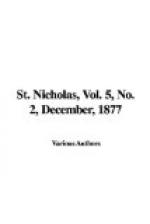One of their chief delights is to wander over the lovely hills and meadows adjoining Sky Farm. Peeping into mossy dells, where wild flowers love to hide, hunting the early arbutus, the queen harebell, or the blue gentian, they learn the secrets of nature, and these they pour forth in song as simply and as naturally as the birds sing.]
SOME VERSES, WRITTEN BY DORA, ON A HUMMING-BIRD’S NEST, WHICH SHE FOUND OVER HER STOCKING ON CHRISTMAS MORNING.
When June was bright with roses fair,
And leafy trees about her
stood,
When summer sunshine filled the air
And flickered through the
quiet wood,
There, in its shade and silent rest,
A tiny pair had built their nest.
And when July, with scorching heat,
Had dried the meadow grass
to hay,
And piled in stacks about the field
Or fragrant in the barn it
lay,
Within the nest so softly made
Two tiny, snowy eggs were laid.
But when October’s ripened fruit
Had bent the very tree-tops
down,
And dainty flowers faded, drooped,
And stately forests lost their
crown,
Their brood was hatched and reared and
flown—
The mossy nest was left alone.
And now the hills are cold and white,
’T is sever’d
from its native bough;
We gaze upon it with delight;
Where are its cunning builders
now?
Far in the sunny south they roam,
And leave to us their northern home.
THE GRUMBLER.
His Youth.
His coat was too thick and his cap was
too thin,
He couldn’t be quiet, he hated a
din;
He hated to write, and he hated to read,
He was certainly very much injured indeed;
He must study and work over books he detested,
His parents were strict, and he never
was rested;
He knew he was wretched as wretched could
be,
There was no one so wretchedly wretched
as he.
His Maturity.
His farm was too small and his taxes too
big,
He was selfish and lazy, and cross as
a pig;
His wife was too silly, his children too
rude;
And just because he was uncommonly good,
He never had money enough or to spare,
He had nothing at all fit to eat or to
wear;
He knew he was wretched as wretched could
be,
There was no one so wretchedly wretched
as he.
His Old Age.
He finds he has sorrows more deep than
his fears,
He grumbles to think he has grumbled for
years;
He grumbles to think he has grumbled away
His home and his fortune, his life’s
little day.
But, alas! ’t is too late,—it
is no use to say
That his eyes are too dim, and his hair
is too gray.
He knows he is wretched as wretched can
be,
There is no one more wretchedly
wretched than he.
DORA.




